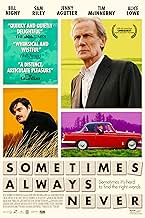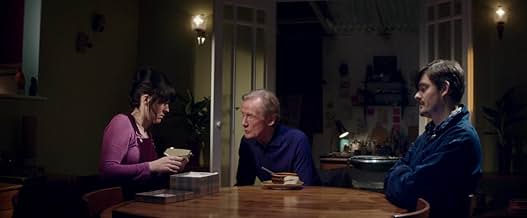IMDb-BEWERTUNG
6,3/10
3465
IHRE BEWERTUNG
Ein Detektivfantasie-/Familiendrama, bei dem die Liebe zu Worten einem Vater hilft, sich wieder mit einem vermissten Sohn zu verbinden.Ein Detektivfantasie-/Familiendrama, bei dem die Liebe zu Worten einem Vater hilft, sich wieder mit einem vermissten Sohn zu verbinden.Ein Detektivfantasie-/Familiendrama, bei dem die Liebe zu Worten einem Vater hilft, sich wieder mit einem vermissten Sohn zu verbinden.
- Auszeichnungen
- 1 wins total
Empfohlene Bewertungen
Despite the rather grim topic, the film manages not to be overly sad. In fact it is an enjoyable journey of a father who becomes obsessed with scrabble in order to cope with his loss. It is a good psychological portrayal pf grief.
'Sometimes Always Never (2019)' is a bit of an oddity, I suppose, because of its combination of mundanity and quirkiness. It tells a grounded - though, ever-so-slightly absurdist - story with a real emotional weight to it, often with genuine subtlety but more frequently with a strange sort of passivity, and tends to toe the line between comedy and drama to the point that a distinction between the two isn't really worth making. It's not like it's particularly unfocused or haphazard, however, as it certainly feels calculated. Yet, even in its almost articulated unwillingness to conform to convention, there's a sort of intangible sense that it doesn't quite know how odd it is. It's exactly what it wants, and needs, to be. As you can tell, it's a fairly difficult experience to categorise. All in all, though, it's an enjoyable one. It has a compelling central theme and a nice set of main characters, even if the former isn't fleshed out as much as you'd like thanks to a somewhat baggy mid-section. The tone of the thing also fluctuates a little. Usually, it balances the serious with the silly, making sure that both do a decent job of developing character, but there are some moments that make you wish the movie would make its mind up as to whether or not its world is actually 'heightened' (which could be pushed further, if that is the case). It sometimes sounds overly 'written', too; this isn't necessarily a bad thing, but the sequences where you actually notice the writing pale in comparison to the ones where you don't. I'll also say that, while it's well directed overall, there are some visual stylistic choices that I don't think pay off. Of course, these issues don't prevent the flick from being generally entertaining. It's somewhat endearing, with great performances and (from what came through in the final result) a good screenplay. It's not perfect, or indeed overly satisfying, and its odd tone - or general 'status', I guess - does make it a bit difficult to get a handle on. Still, it's a good effort that nicely tells a personal, rather unique story. 6/10
A single delicious narrative conceit drives the delightful Sometimes. Always. Never. (2018). It takes its own sweet time getting there, but when it does, it hits home: you can be an expert in words and their rules but be incapable of meaningful expression. Add a Scrabble obsession, mix it with deep grief and guilt, and you have a portrait of a family desperately unable to communicate with each other.
The simplicity of the plotline stands in stark contrast to the complexity of its themes. Dapper rule-bound tailor Alan (Bill Nighy) is told that the body of his long-missing son Michael may have been found. He takes his younger estranged son Peter (Sam Riley) with him to identify the body, and at the morgue they meet other parents who are there for the same reason. It's a diversion that does little to advance the narrative, but it does provide comic respite from the pain of loss. Both relieved and disappointed with the outcome, Alan invites himself to stay with Peter and his family in the hope of reconciliation.
With a threadbare plot, the power of this film comes from its theatrical settings, intelligent banter, and Nighy's trademark whimsical mannerisms and stylised performance. The label 'fantasy drama' has been applied to this film but is mis-leading and manifestly inadequate. If there is an element of fantasy, it derives from the way many scenes are played out against backgrounds that are have a surreal, even an absurdist two-dimensional feel that resembles a theatre set. Like all absurdism, there is an artful space between the underlying emotional intensity and the futility of ever trying to understand it. The gravelly Nighy is a master of under-statement, with a unique talent for giving shallow dialogue depth and humour. It's all about contrasts: Alan's obsession with a missing son and neglect of the son he still has; his fastidious Dymo labelling of everything as a substitute for control in his world; and his ability to make light of the heaviest emotions.
If you are not a Nighy fan or prefer action-based stories, you may find little to appreciate in this film. In place of a forward-moving narrative it offers a portrait of a dysfunctional family torn apart over guilt and the inability to emotionally connect. The film's title is itself a parody of form over function, referring to the tailor's rule for how jacket buttons should be fastened: the top always, the middle sometimes, the bottom never. With no substantive relationship to the film's content, it's a rule as good as any on how to live one's life.
The simplicity of the plotline stands in stark contrast to the complexity of its themes. Dapper rule-bound tailor Alan (Bill Nighy) is told that the body of his long-missing son Michael may have been found. He takes his younger estranged son Peter (Sam Riley) with him to identify the body, and at the morgue they meet other parents who are there for the same reason. It's a diversion that does little to advance the narrative, but it does provide comic respite from the pain of loss. Both relieved and disappointed with the outcome, Alan invites himself to stay with Peter and his family in the hope of reconciliation.
With a threadbare plot, the power of this film comes from its theatrical settings, intelligent banter, and Nighy's trademark whimsical mannerisms and stylised performance. The label 'fantasy drama' has been applied to this film but is mis-leading and manifestly inadequate. If there is an element of fantasy, it derives from the way many scenes are played out against backgrounds that are have a surreal, even an absurdist two-dimensional feel that resembles a theatre set. Like all absurdism, there is an artful space between the underlying emotional intensity and the futility of ever trying to understand it. The gravelly Nighy is a master of under-statement, with a unique talent for giving shallow dialogue depth and humour. It's all about contrasts: Alan's obsession with a missing son and neglect of the son he still has; his fastidious Dymo labelling of everything as a substitute for control in his world; and his ability to make light of the heaviest emotions.
If you are not a Nighy fan or prefer action-based stories, you may find little to appreciate in this film. In place of a forward-moving narrative it offers a portrait of a dysfunctional family torn apart over guilt and the inability to emotionally connect. The film's title is itself a parody of form over function, referring to the tailor's rule for how jacket buttons should be fastened: the top always, the middle sometimes, the bottom never. With no substantive relationship to the film's content, it's a rule as good as any on how to live one's life.
Just to address the marmite topic brought up by another reviewer: It was illustrated in the film that Billy Nighy's character Alan was not a reliable story teller. He liked to tell tall tales, like the one about the grandmother with the coal seam in the basement.
Going back to the movie, I thought it was quirky like everyone mentioned. I knew it wasn't going to be a straight forward dramedy based on the bizarre, artificial riding in car scenes. It looked like it was done in a 1950s B movie style.
Thankfully the movie dials back on that and delivers a fairly straight forward, drama comedy framed around the game of scrabble, but really about Alan and his son Peter, as they try to solve the mystery of the missing son Michael. The body viewing scene (which we don't see) was particularly odd, because we were told that Michael went missing many many years ago when he and Peter were still children. So why would they be called to identify a body? If it was an adult's body, how would they know it was him. Usually they do DNA tests anyway.
Other than that weird start, and some scene involving a boat (or did it?), much of the movie follows a fairly linear format. I think it helps that every character in the movie had something to offer the movie, and generally everyone was likeable. You kind of hoped there would be a resolution of the 'mystery', but ultimately it didn't really matter. Nothing is really 'solved' by the ending, except maybe Peter wasn't as resentful of his missing brother's 'Prodigal Son' stature, and maybe Alan realized it was time to focus on his existing family.
A very surreal looking film. Interesting colours and tones and deliberate filming car scenes over a filmed background.
In essence it is about relationships and long-term grief ... and scrabble.
It is worth a watch.
In essence it is about relationships and long-term grief ... and scrabble.
It is worth a watch.
Wusstest du schon
- WissenswertesThe film is based on a short story called Triple Word Score, written by the script writer Frank Cottrrel Boyce.
- PatzerWhen Alan claims that "jazz" is a high-scoring word in Scrabble, a character corrects him by stating it's impossible to play since there's only one Z tile in the set. In reality, this word is indeed playable using "wild card" tiles. If using J, A, and Z tiles and a wild card tile in place of the other Z, the word would be a high-scoring word worth a minimum of 19 points.
- VerbindungenFeatured in Projector: Sometimes Always Never (2019)
- SoundtracksSometimes Always Never
Written by Edwyn Collins and Sean Read
Performed by Edwyn Collins, Sean Read and Chay Heney
Top-Auswahl
Melde dich zum Bewerten an und greife auf die Watchlist für personalisierte Empfehlungen zu.
- How long is Sometimes Always Never?Powered by Alexa
Details
- Erscheinungsdatum
- Herkunftsländer
- Offizieller Standort
- Sprache
- Auch bekannt als
- Triple Word Score
- Drehorte
- Produktionsfirmen
- Weitere beteiligte Unternehmen bei IMDbPro anzeigen
Box Office
- Bruttoertrag in den USA und Kanada
- 39.191 $
- Eröffnungswochenende in den USA und in Kanada
- 2.599 $
- 14. Juni 2020
- Weltweiter Bruttoertrag
- 1.417.047 $
- Laufzeit1 Stunde 31 Minuten
- Farbe
- Seitenverhältnis
- 2.35 : 1
Zu dieser Seite beitragen
Bearbeitung vorschlagen oder fehlenden Inhalt hinzufügen

Oberste Lücke
By what name was Sometimes Always Never (2018) officially released in India in English?
Antwort






























